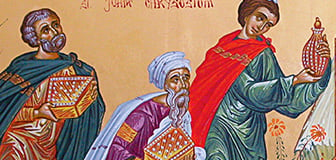In the Gospel we read that Jesus told a rich young man that though he has kept the commandments, the one thing he must do to inherit eternal life is to sell all that he owns, distribute the money to the poor, and then come, and follow Him. Luke writes, “But when he heard this, he became sad; for he was very rich. Jesus looked at him and said, ‘How hard it is for those who have wealth to enter the kingdom of God! Indeed, it is easier for a camel to go through the eye of a needle than for someone who is rich to enter the kingdom of God.’”
It would be easy to misunderstand Jesus here and to assume that it’s impossible for a rich person to get into heaven. But Jesus was most likely making an example of this self-righteous young ruler. He is a sad example of a person who is convinced he is religious, but misses the whole point. He followed the letter of the law, yet he did not carry love in his heart.
St. Clement warns us not to interpret this passage to mean that wealth will keep us from the kingdom of heaven. He writes that it is the attitude of the soul that is important. It is the passion for wealth, not the wealth itself that condemns a man.
Our attitude toward possessions reveals our true god and master. This may be troubling to us when we feel that we have made God our master and have kept all the commandments – as did the rich young ruler. Christian stewardship of our souls and bodies is the offering of our entire self to God, attaching our desire to Him rather than to the world.
And Jesus’ reference to “the eye of the needle” seems to imply that it is impossible for a rich man to enter the kingdom of heaven. One interpretation of this troubling verse is that a well-known gate to the city of Jerusalem was referred to as the “eye of the needle.” This gate was very low and difficult to enter, and, according to legend, a camel was required to unload all of its pack and enter on its knees. One could conclude from this that it is extremely difficult -- though not impossible -- for a rich man to enter the kingdom of God.
Throughout the Gospels, Jesus shows us that the only lasting wealth is spiritual wealth, which comes from God.
When we were baptized, we were given the light of Christ, symbolized by the baptismal candle. God lit His flame in our souls. The purpose of baptism is to make us lights to the world for Jesus.
Jesus instructs us to …"let our light shine before others, so that they may see our good works and give glory to our Father who is in heaven."
As baptized Orthodox Christians, we are all called to witness “through the quality of our lives the experience of the risen Christ.”
We witness to Christ by the way we set our priorities in life. This is a time to re-examine those priorities -- the way in which we share our time, our talents and our possessions.
I challenge you to take a look at your checkbook and see exactly what your true priorities are. Do you commit more to the cable television service than you do to your Church? Do you pay more for your daily newspaper or to the cable company than you do to support the spreading of the Good News of Christ?
As Jesus told us, “Where your treasure is, there will your heart be also.”
Last night you may have seen the moon as it rose in the east. It was huge and it lit up the night. But if you think about it, the moon has no light of its own, but only the light which it receives from the sun. The light we see when the moon lights up the night is the reflected light of the sun.
Just like the moon, we have no light of our own, only the light of Christ, who told us that He is the “light of the world.” We received His light at our baptism, and we are called to reflect that light to all the world. What better way to begin to do that than by returning to Him – through the work of the Church – some portion of that with which He has blessed us.
We are responsible – and are held responsible by God – for the light – His light – that we are reflecting in the world.
Psalm 116 asks: “What shall I give to the Lord in return for all His benefits toward me?”
The answer comes in the Divine Liturgy when we are invited to “offer ourselves and our whole life to Christ our God.”
I conclude with the following story:
A pig and a chicken were walking through the barnyard one day, planning a birthday party for Farmer Brown. “And what do you suggest that we do for Farmer Brown?” asked the pig. The chicken replied, “I was thinking of making him a ham & egg breakfast.”
The pig, troubled by this idea, quietly said to the chicken, “For you this is a contribution, but for me it’s a total commitment.”
God does not ask us for a contribution, because his Church is not a club to which we pay dues. He is asking for a total commitment --- our life!
May He continue to bless us all. Amen.
Father James W. Kordaris
